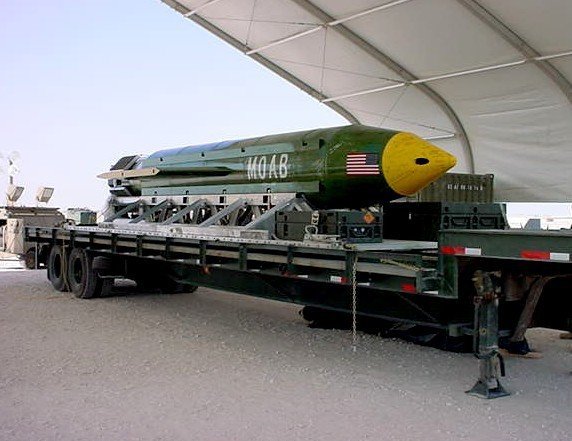The Afghan defence ministry has confirmed that up to 36 suspected Islamic State militants were killed in Afghanistan, yesterday when the US dropped its bomb on ISIS tunnels in the Nangarhar province of Afghanistan.
The United States of America, on Thursday, dropped a GBU-43 bomb which is colloquially dubbed as ‘the Mother of All Bombs’ by the military, it actually stands for Massive Ordnance Air Blast (MOAB). The GBU-43 developed in the 2000’s and is the largest non-nuclear bomb used in a combat, it has the explosive yield of more than 11 tons of TNT. Only the Massive Ordnance Penetrator GBU-57, which has never been used in war, is a larger conventional weapon. The GBU-43 was deployed in eastern Afghanistan territory, close to the border with Pakistan, where it is said by the US military, Da’ish (ISIS) had a series of caves and bunkers housing the militants in Afghanistan.
Adam Stump, the Pentagon spokesman, said the bomb had been transported to Afghanistan some time ago for its use and was dropped from the US MC-130 special operations transport.
As US officials said that according to their intelligence report, Da’ish is based overwhelmingly in Nangarhar and Kunar provinces. They estimate the number of fighters in the two provinces is 700 but according to Afghan officials the number is higher closer to 1,500.
Read more: Peace in Afghanistan necessary to defeat ISIS in the region
Adam Stump, the Pentagon spokesman, said the bomb had been transported to Afghanistan some time ago for its use and was dropped from the US MC-130 special operations transport. Following which, Army Gen. John W. Nicholson, commander of the US forces in Afghanistan, said that this is the right munition to use against ISIS.
ISIS is already in cahoots with Tehreek-e-Taliban Pakistan and is extending its alliance with Lashkar-e-Jhangvi, Islamic Movement of Uzbekistan, and militants from China and Central Asian Republics (CARs).
Sean Spicer, White House spokesman, said that the US had undertaken precautionary measures to prevent collateral damage and civilian casualties. Further, he asserted that America is taking the fight against ISIS very seriously and in order to defeat them, they should not be given any room to breathe or operational space, for which the bomb was used.
Meanwhile, Donald Trump, President of the United States, projected the bombings as an evidence of a much stronger US foreign policy in comparison with Obama’s tenure.
Read more: US and Russian War Against ISIS in the Middle East Threatens Turkish and Saudi Fault-Lines
Addressing the reporters at White House, Trump said, “If you look at what’s happened over the last eight weeks and compare that really to what’s happened over the last eight years, you’ll see that there’s a tremendous difference.”
When asked if he had authorized the bombing, Donald Trump said: “Everybody knows exactly what happened. What I do is I authorize my military. We have the greatest military in the world and they’ve done a job as usual. We have given them total authorization and that’s what they’re doing and frankly, that’s why they’ve been so successful lately.”
Under the Trump administration, there has been an increase in the number of airstrikes the U.S. military has carried out in Afghanistan. From January to March, the U.S. Air Force dropped over 450 bombs in the country, as compared to the whole of 2016 when it was 1,300.
US markets have become very jittery and went down after the news, the dollar weakened and the stock markets went down.
Threat of ISIS
This is the first time the US has taken such an initiative against ISIS, after the continuous fight in Syria where Russia later intervened and by conducting several air-strikes to dismantle ISIS.
Islamic State’s presence in the Nangarhar province of Afghanistan is a source of concern not just to Pakistan, but to other countries including Russia and China. This presence has a potential to wreak havoc in the region, thus seeking the attention of the regional powers.
As Islamic State has proved its growing power with frequent attacks in both Afghanistan and Pakistan. The organization is already in cahoots with Tehreek-e-Taliban Pakistan and is extending its alliance with Lashkar-e-Jhangvi, Islamic Movement of Uzbekistan, and militants from China and Central Asian Republics (CARs).
Read more: Tide has turned dramatically against ISIS on almost every front
The last two weeks has seen the US on the front foot – first the missile attack into Syria after the gas attack in Idlib and now this bombing of ISIS in Afghanistan. While, it is still not clear if this is the start of a more aggressive US policy against ISIS it will certainly put stress on Russian initiative in both regions.
“Our goal is to defeat ISIS-K in Afghanistan in 2017,” U.S. Navy Captain Bill Salvin, a spokesman for the U.S. military command in Kabul
Reaction from Afghanistan has been hostile with Karzai putting pressure on Ashraf Ghani to push back American on the issue.
Omar Zakilwal, Afghanistan’s Ambassador to Pakistan tweeted and called the American action reprehensible and counter productive.
1/2: I find the use of the largest non- nuclear bomb, the so called “mother of all bombs”, on our soil reprehensible & counterproductive.
— Dr Omar Zakhilwal (@DrOmarZakhilwal) April 14, 2017
2/2: If big bombs were the solution we would be the most secure place on earth today.
— Dr Omar Zakhilwal (@DrOmarZakhilwal) April 14, 2017














